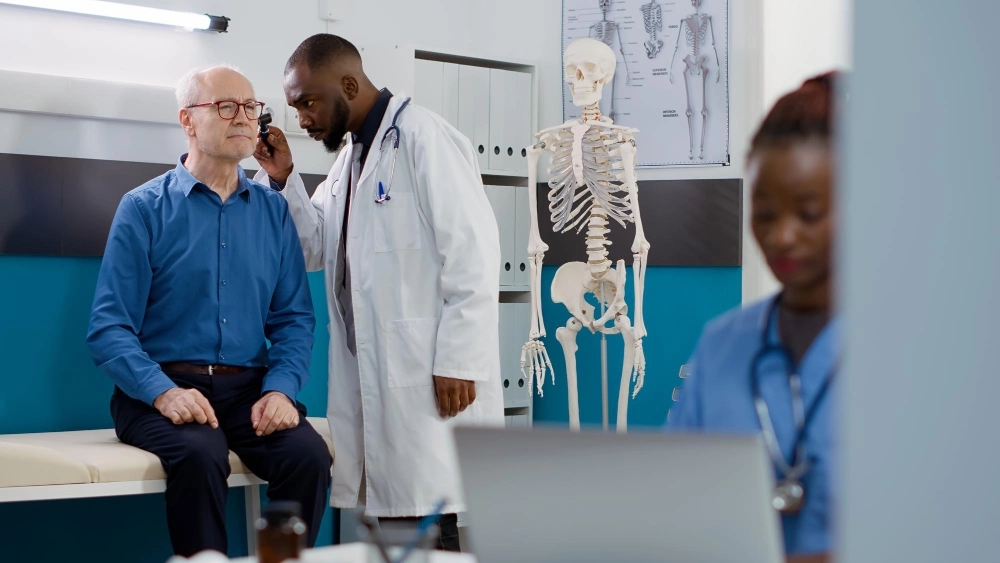
Patients who visit an ENT specialist may suffer from ear/nose/throat infections, hearing loss, dizziness, tinnitus, and ear, face, or neck pain.
A team of experienced ENT doctors from Choithram Memorial Hospital work round-the-clock to keep your vital organs healthy. We are equipped to treat all ENT diseases at our Multispeciality and excel in the following subspecialties:
Otology
It is a branch of medicine concerned with studying illnesses of the ear, including the middle ear and inner ear. A few examples include tympanoplasty (repairing perforations in the eardrum), ossiculoplasty (for conductive hearing loss), mastoidectomy for cholesteatoma, and cochlear implants (for severe sensorineural hearing loss).
Rhinology
This includes diseases of the nose and sinuses, as well as septoplasty (correction of the DNS) and rhinoplasty (cosmetic rejuvenation of the nose).
Laryngology
The field of laryngology focuses on diseases of the larynx, changes in the voice, and laryngeal infections and diseases.
Dysphagia
In some medical conditions patients may have difficulty in swallowing. Our Hospital offers effective treatment for such conditions.
Vertigo
Our hospital offers comprehensive care for this condition which affects balance, causes dizziness, and impairs quality of life.
Snoring & Sleep Apnoea
Snoring is not just a taboo in society; it can also meddle with our sleep patterns. There are serious health-risks associated with sleep apnoea, which are mitigated by medical experts.
Pediatric ENT
Snoring, sleep apnoea, and tonsillitis are diseases of the ear, nose, and throat that affect children of all ages. Children with breathing difficulties and airway problems such as laryngomalacia and subglottic stenosis are carefully examined at our hospital.
The Treatment & services available are:
State-of-the-art instrumentation adhered to the quality standards
Choithram Memorial Hospital is built differently, not only in terms of its architecture but also through the reflection of its values and principles. Our ENT department owns all pieces of ENT equipment that are required to provide top-notch care.
Cost-effective medical care for individuals and communities
Our goal is to provide the best possible service to all individuals and communities at the most affordable price.
Asepsis of a higher standard
Infection is one of the most common reasons post surgery. The operating theater is staffed with trained staff, hence we ensure safety at all times.
When do you need ENT?
It's time to see the ENT clinic if you're suffering from sinus issues, chronic ear infections, or throat problems. Medications or non-invasive treatments are often available from ear, nose, and throat. At times the condition might require surgical intervention. Outpatient ENT surgery is usually minimally invasive and can be completed in an outpatient setting.
The following are three of the most common operations performed by ENT doctors in our department:
1. Tonsillectomy
You could be a good candidate for a tonsillectomy if you suffer from persistent sore throats, tonsil stones, sleep apnea, or difficulty swallowing. It is possible to survive without tonsils even though they are part of the immune system. There are two valid reasons to have tonsils removed: chronic tonsil infections and masses or lesions on the tonsils.
Tonsils are removed through the mouth during the outpatient procedure, which takes about 45 minutes.
2. Myringotomy
It is possible for ear fluid to build up in the middle ear as a result of chronic ear infections or dysfunctional Eustachian tubes. The condition can affect hearing and sometimes cause dizziness, fevers, and malaise. The problem can be resolved with a myringotomy performed by an ENT specialist. To relieve pressure on the eardrum, the doctor will make a small incision in it. It is sometimes necessary to place a small tube in the incision to keep it open, allowing the ear and eustachian tube to drain, ventilate, and heal.
3. Endoscopic Sinus Surgery
Do you suffer from frequent or prolonged sinus infections? There are times when medication isn't enough. There may be a solution in endoscopic sinus surgery. An ENT doctor will insert a small endoscope into the nose and use microsurgical instruments to open blocked sinus passages. They will be able to drain more freely and infections will be less likely to occur. You can expect a 1-week recovery period after the endoscopic sinus procedure.